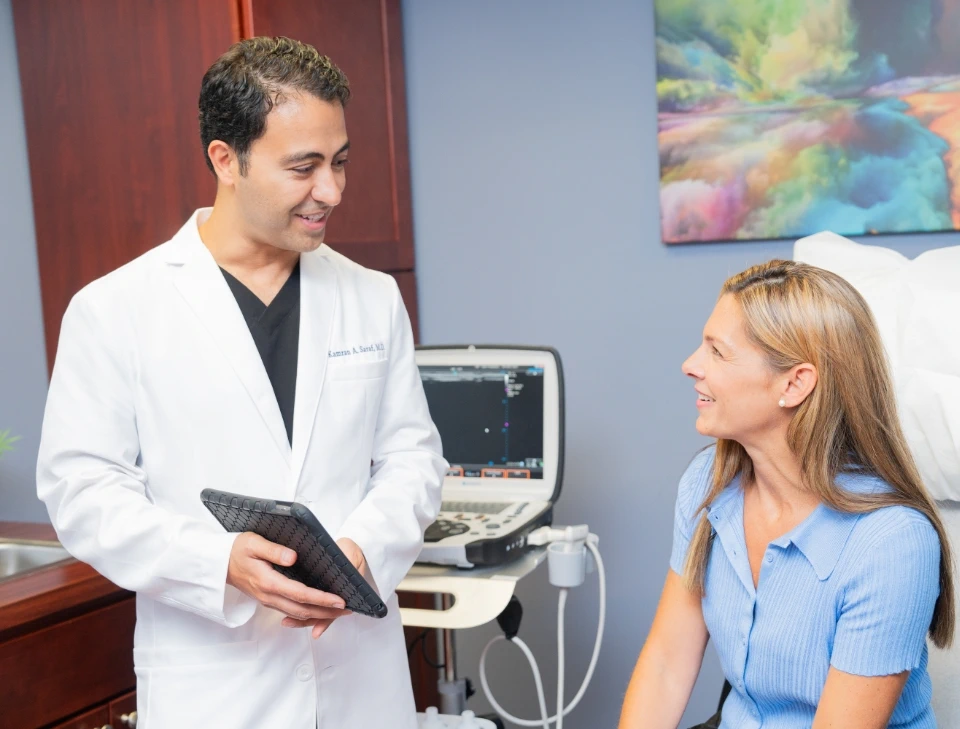If you’re concerned about weak valves in leg veins, you may have some concerns about your vascular health. The valves in your veins are extremely important mechanisms that ensure smooth one-way blood circulation to the heart. If your vein valves are collapsed or damaged, you can experience numerous complications and problems. But to understand the consequences of weak valves in leg veins, you must understand how veins function.
The human body consists of two types of blood vessels — arteries. The arteries carry blood from the heart to different parts of the body, and the veins pump blood back to the heart. The veins essentially carry blood from various parts of the body, such as the legs, arms, face, and more, to your heart. The veins also carry blood against the force of gravity (legs to the heart), and the valves in the veins assist in that function.

The valves in the veins essentially act as one-way doors, allowing blood to flow towards the heart but not backward due to gravity. But the valves in the veins can also weaken because of numerous factors, such as increased estrogen and progesterone in the body, increased pressure, obesity, pregnancy, and other factors. When the vein valves weaken, they have a higher risk of collapsing or malfunctioning.
When the vein valves collapse or malfunction, blood flows backward due to gravity and accumulates in the leg veins. The continued accumulation of blood in leg veins due to weakened vein valves is known as chronic venous insufficiency, the leading cause of most vein problems. When more blood accumulates in the leg veins, the vein walls start dilating and expanding, leading to spider veins, varicose veins, and other vein problems.
As such, if you have weak valves in leg veins, you have a higher risk of spider veins, varicose veins, and chronic venous insufficiency.

What are the early warning signs of chronic venous insufficiency?
Chronic venous insufficiency is a progressive condition that worsens with time. Once the vein valves are damaged, they can’t heal naturally, so blood continues accumulating in leg veins. The earliest warning signs of vein disease are leg swelling, leg pain, frequent leg cramps, restless leg syndrome, leg heaviness, and spider veins. Most of these signs and symptoms are misattributed to aging or exhaustion, making vein disease one of the most underdiagnosed conditions.
The signs and symptoms of chronic venous insufficiency worsen at the end of the day or after long periods of sitting or standing still. When more blood accumulates in the leg veins, the symptoms of vein disease worsen. As such, if you notice increased leg heaviness, restless leg syndrome, and leg cramps at the end of the day or after long periods of inactivity, you probably have chronic venous insufficiency.
Since chronic venous insufficiency continues worsening with time, it’s in your best interest to consult a vein doctor at the earliest stage possible.
What happens if you don’t treat chronic venous insufficiency?
If you don’t treat chronic venous insufficiency at the earliest stages, the condition will continue worsening. You may eventually develop varicose veins, i.e., dense blood vessels that bulge out of the skin’s surface in a twisted, tangled, and knotted form. Varicose veins can cause considerable discomfort, they look ugly, and they also indicate advanced vein disease. If you notice varicose veins, you must contact a reliable vein doctor or vein treatment clinic without delay.
If blood continues accumulating in the leg veins, the varicose veins will also continue expanding until they burst, leading to profuse bleeding. You may also develop skin discoloration because of insufficient blood circulation in the legs, non-healing leg wounds (ulcers) because of improper healing, and blood clots in the leg veins (deep vein thrombosis). If the blood clots break away, they may travel to the lungs and cause a potentially fatal pulmonary embolism.
What causes vein valves to weaken?
There is no specific cause of the weakening of vein valves. Your vein valves may weaken for a wide range of reasons, such as genes, aging, pregnancy, obesity, and other factors. The following are some of the primary risk factors for weak vein valves:
- Genes: If your parents have a history of vein problems, there’s a strong chance that your vein valves are more prone to weakening or collapsing.
- Sex: Women are more likely to have weak vein valves because progesterone and estrogen hormones can weaken the vein valves.
- Pregnancy: The vein valves are further weakened during pregnancy because of increased pressure on the veins and an increased volume of progesterone and estrogen.
- Age: As you grow older, the valves in your veins gradually become weaker.
- Occupation: Your vein valves may weaken if you spend long periods of time sitting or standing still because of your job. That’s why vein disease is particularly common amongst nurses, drivers, pilots, teachers, and individuals with desk jobs.
How can I strengthen my leg valves?
- Engage in cardiovascular exercises that activate your calf muscles, such as running and yoga.
- Drink lots of water and follow a balanced diet with lots of fibers and vitamin C.
- Elevate your legs above your heart’s level while sitting down.
- If you have a desk job, take short breaks to walk around the office.
What kind of doctor treats poor circulation in the legs?
If you’re concerned about weak vein valves, spider veins, varicose veins, or other vascular problems, you need to contact a vein doctor (officially called a phlebologist). Our vein treatment clinics are led by Harvard-trained and board-certified vein doctors specializing in cutting-edge treatments for chronic venous insufficiency and all other vein problems. If you notice the signs and symptoms of vein disease, please schedule an appointment with our vein doctors.








